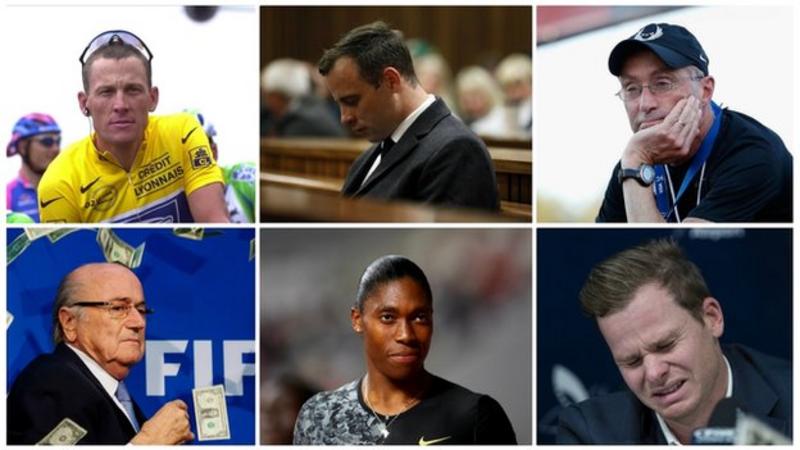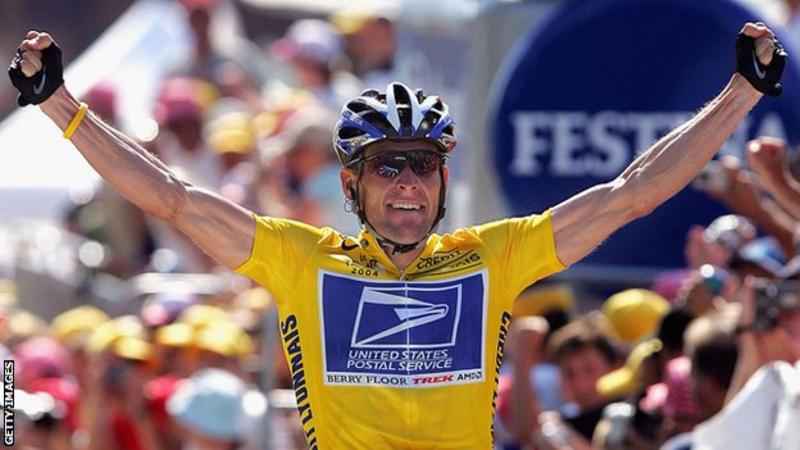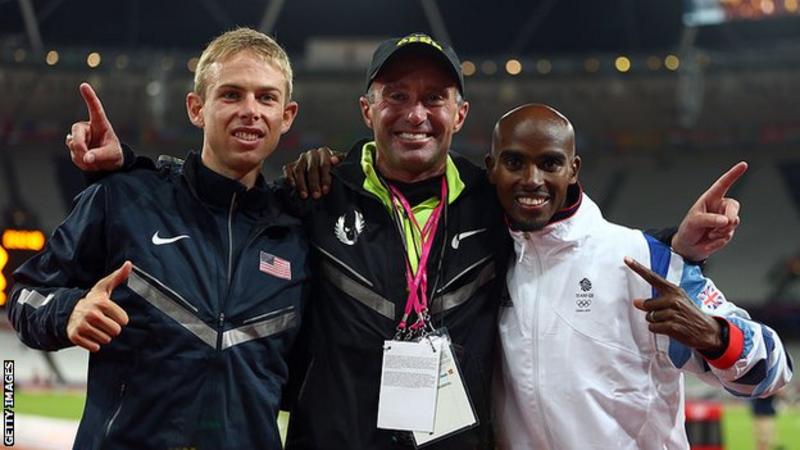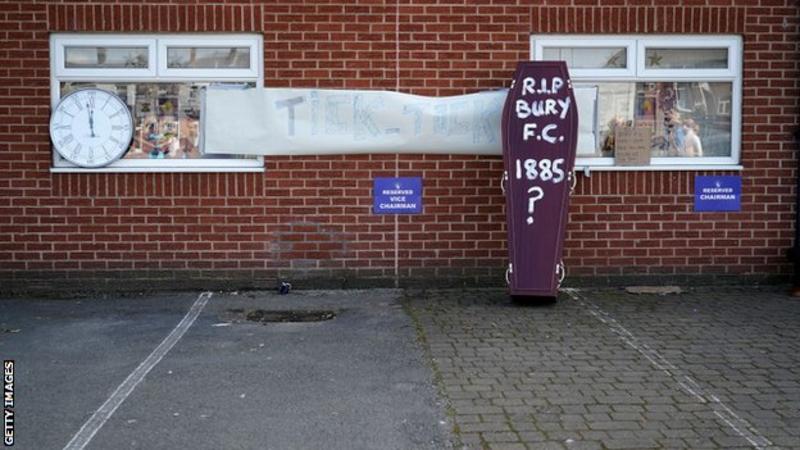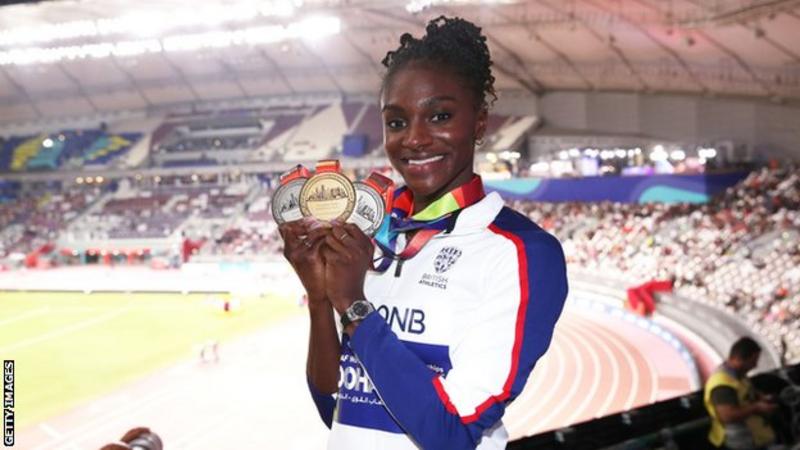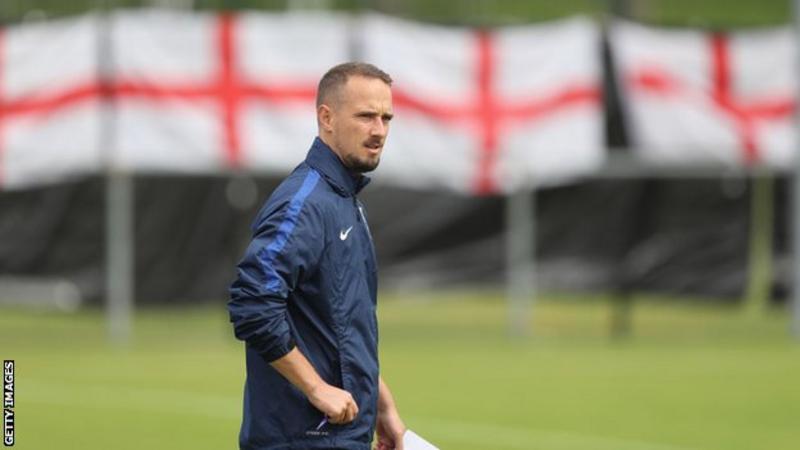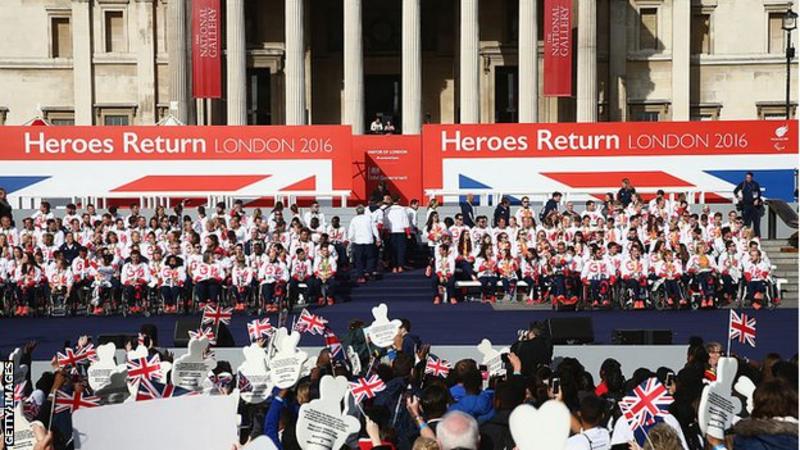Since joining the BBC in 2010, sports editor Dan Roan has covered many of the biggest sports news stories of the past decade.
Here he revisits some of the off-field issues that have defined a remarkable era and shifted sport’s landscape in a way never seen before.
Doping
Such was his dominance on the bike, his superstardom off it, and the sophistication of the doping regime he led, Lance Armstrong remains one of sport’s most infamous drugs cheats.
On the one hand, the demise of the disgraced American cyclist and cancer survivor in late 2012 was indicative of a sport in the grip of a doping culture.
But the groundbreaking pursuit of Armstrong by the US Anti-Doping Agency (Usada) seemed to prove that no-one was too big to bring down. His TV confession to cheating his way to all seven of his Tour de France titles the following year shattered sport’s greatest fairytale, and provided one of the sporting decade’s most defining moments.
From Tiger Woods’ televised apology for serial philandering in early 2010 to Oscar Pistorius’ murder conviction six years later, the 2010s bore witness to some staggering falls from grace. But the sense was that Armstrong’s would shift the landscape like no other because his offending directly impacted his sport.
But any hope that the suspicion surrounding cycling would lift as a legacy of Armstrong’s downfall soon faded.
Having competed for the first time in 2010, Team Sky went on to dominate cycling in the years that followed. At the turn of the decade, no British rider had ever won the Tour de France. Since then, three have done so, with Chris Froome managing the feat four times.
For several years, ‘marginal gains’ was credited with transforming British cycling’s fortunes on both the road and the track, where it became the driving-force behind successive Olympic triumphs.
But during the second half of the decade, Team Sky came under mounting scrutiny over how they managed to win so much amid a series of controversies.
Among them was the failure to keep basic medical records, Froome being cleared of wrongdoing after an adverse analytical finding for salbutamol, and revelations over separate unresolved scandals over two medical deliveries; the first a mystery jiffybag for Sir Bradley Wiggins, the second a batch of testosterone to the national velodrome.
By the time of the nadir when a parliamentary committee accused the team of “crossing the ethical line” over Sir Bradley Wiggins’ use of therapeutic use exemptions (TUEs) in a damning 2018 report, some of the biggest names in British sport had been tainted, and its founding claim to be ‘whiter than white’ consigned to history. Sky withdrew its backing a few months later, the team only saved by the investment of Ineos, a major new power in British sport.
Team Sky and their riders always denied any wrongdoing and rejected accusations they had ever cheated their way to success. But a landmark medical tribunal to determine if former chief medic Dr Richard Freeman ordered testosterone to help an unnamed rider to cheat nine years ago will resume in 2020.
The rise and fall in reputation of the country’s most successful but controversial team has been one of the decade’s most significant sports stories. And decisive moments could still lie ahead.
Many other sports have suffered their own doping-related crises over the last 10 years of course, especially in athletics, where its most powerful figure, Lamine Diack, was banned for life for extorting money from cheats whose positive tests he helped to cover up.
The demise of the disgraced former IAAF president led to his British successor Lord Coe fighting to salvage his own reputation amid questions over both his judgement and association with Diack.
Despite a bruising period of intense scrutiny, the man credited with delivering London 2012 survived and has always denied any wrongdoing.
Another result of Diack’s downfall has been ongoing criminal investigations in France and Brazil into wider allegations of bribery connected to the Rio 2016 and Tokyo 2020 Olympic bids.
Diack will stand trial in Paris in 2020 on charges of corruption and money laundering.
Given his long association with Britain’s most decorated track and field star Sir Mo Farah, and the hugely powerful sportswear giant Nike, legendary American coach Alberto Salazar’s four-year ban in the middle of the 2019 World Championships for various doping violations after a long Usada investigation was another highly damaging episode for the sport.
Amid intense scrutiny of its close relationship with the disgraced running guru, the scandal has plunged UK Athletics into the gravest crisis in its history, and amid fresh allegations and an appeal by Salazar, the story will rumble on well into 2020.
But when it comes to the sheer scale of cheating, the political power of the guilty party, and the ramifications of the fall-out, one scandal this decade is in a category all of its own.
In 2015 a World Anti-Doping Agency (Wada) report laid bare the details of a conspiracy like no other. Masterminded by the former head of Moscow’s anti-doping lab turned whistle-blower Dr Grigory Rodchenkov, Russia’s state-sponsored doping racket implicated 1,000 athletes across multiple sports and sabotaged successive Olympic Games – including London 2012 – now known as the dirtiest statistically in history – with more than 130 competitors since disqualified.
In the years that followed, more gory details have emerged, the scandal doing untold damage to the credibility of major institutions like the International Olympic Committee (IOC) and Wada, undermining the anti-doping system, eroding public trust, and dominating the build-up to both Rio 2016 and Pyeongchang 2018 – from which the Russian team were banned.
It now threatens to do the same to Tokyo 2020 with Russia recently hit with an unprecedented (but qualified) four-year ban from major international events after another audacious cover-up.
But with an appeal yet to be heard, and some athletes furious that an outright ban was avoided, it is clear that this crisis will extend well into the 2020s. Surely the greatest scandal sport has ever known.
Media playback is not supported on this device
Corruption
Another sporting mega-story the past decade will always be remembered for was Fifa’s corruption scandal.
Allegations of skulduggery had hung around world football’s governing body for years. But it was only in the 2010s that the people at the heart of the organisation faced accusations amid a crisis that shook Fifa to its core.
Nine years after it stunned the world by awarding the right to host its flagship event to the tiny desert-state of Qatar, Fifa is still trying to recover from allegations surrounding how exactly the country won the vote, the human cost of building the infrastructure for the event, and the disruption a first winter World Cup will cause.
Five years after that vote came those dramatic dawn police raids with numerous Fifa officials arrested in Zurich on corruption charges amid a sprawling FBI investigation into tens of millions of dollars’ worth of bribes connected to marketing and TV contracts in the Americas.
This – along with the subsequent downfalls of Fifa’s long-reigning president Sepp Blatter and one-time heir apparent Michel Platini shortly afterwards over a “disloyal payment” – brought the organisation to its knees. Both men, along with the Qatar bid, have always denied wrongdoing.
But more than any other, the scandal came to symbolise a number of issues; sub-standard governance across sport, the greed and unchecked excess at the top of world football, and the vast wealth generated by deals with sponsors and TV companies.
The exploitation of sport as a form of ‘soft-power’ by countries like Qatar with questionable human-rights records to furnish their image was nothing new. But the 2010 vote – which also included handing the 2018 World Cup to President Vladimir Putin’s Russia of course – came to symbolise sport’s increasing willingness to do deals with repressive regimes. It is noticeable that the term ‘sportswashing’ only entered the sporting lexicon in the last few years.
Fifa will argue that a legacy of its corruption scandal has been an overhaul of its leadership, and key governance reforms.
But with criminal investigations into the bidding processes for both the 2018 and 2022 World Cups continuing in Switzerland and France, fresh jail sentences and life bans handed to former officials, and almost three years still until Qatar hosts what is set to be the most controversial sports event in history, it will be a long time – if ever – before Fifa’s credibility is truly restored.
Rule breaking
The 2010s have provided many other sporting scandals involving allegations of cheating, deceit or rule breaking.
In 2011 three Pakistani cricketers were jailed for their roles in an astonishing spot-fixing scandal, which had exploded the previous year, forcing the game to confront the threat of gambling-related corruption.
More recently, rugby union was shaken to its core by the 35-point deduction handed to Saracens – the English club game’s dominant force – for breaching salary cap regulations.
Meanwhile, Manchester City – the Premier League’s dominant force in the 2010s – are waiting to discover if Uefa finds them guilty of misleading European football’s governing body over financial fair play rules. City deny wrongdoing but if they lose the case, a sensational ban from the competition they covet more than any – the Champions League – could be their punishment.
Bury became the first club to be expelled from the Football League since 1992 when they failed to provide proof of funds, their demise a stark symbol of mounting concerns over the sustainability of football finances.
But in terms of resonance, perhaps one sports scandal this decade stands out.
Australian cricket’s ball-tampering ‘sandpaper plot’ in 2018 led to a series of teary resignations in front of the cameras, long bans and an unprecedented bout of soul-searching – by both the country, which suddenly faced an identity crisis, and a sport that feared its fabled values had been abandoned in favour of a win-at-all-costs culture.
Technology
The decade has seen rapid changes in technology that have affected sports in ways few predicted 10 years ago.
Controversy over whether advancements in sports equipment unfairly enhance athletes’ performances is nothing new. But the debate has been reignited by mounting concern over the latest version of Nike’s carbon-fibre plated Vaporfly running shoes – reinforced by Eliud Kipchoge’s historic sub-two hour marathon while wearing them – and then Brigid Kosgei’s obliteration of the women’s marathon record in a similar pair the following day.
A few months out from the Tokyo Olympics, athletics is facing tough questions over the tension between the inevitable quest for innovation and the core principle of fair competition. Both the IAAF’s rules and the record books are being challenged in a way not seen for years. And those in power are under intensifying pressure to do something about it.
In a bid to avoid on-field injustices and overcome human error in officiating, sports have tried to harness broadcasting advancements over the last decade.
Some, like goal-line technology in football which was approved in 2012, has proved a success. But others, most notably the video assistant referee system (VAR), has been hugely controversial, especially in the Premier League, where its first season of use has descended into farce over marginal offside decisions, sparking fury from fans and managers.
More than any other, the VAR crisis sums up sport’s struggle to navigate the inexorable march of technology without relinquishing the soul and spontaneity that cultivates a lifelong attachment with so many fans across the world. A question that is both technical and existential, and one that must be answered satisfactorily in the near future if sport is to maintain its importance for a new generation of fans in the 2020s.
Gender
The 2010s has been a game-changing decade in terms of the profile, popularity and perception of women’s sport.
Certain key moments stand out: the trailblazing London 2012 victories of Jessica Ennis and Nicola Adams, Fallon Sherrock making history by beating male opponents in darts’ World Championship, Bryony Frost becoming the first woman to ride a Grade One winner at Cheltenham, Dina Asher-Smith winning Britain’s first global women’s sprint title and Simone Biles redefining gymnastics.
The record TV audiences that watched the groundbreaking 2019 Fifa Women’s World Cup felt like a watershed moment. As had the inspiration provided by Team GB’s gold-medal winning hockey players at Rio 2016, England’s World Cup-winning cricketers in 2017, and their triumphant netball team at the Commonwealth Games in 2018.
Then there was the emergence of US football star Megan Rapinoe as sport’s leading voice on equality and women’s rights, the face of a new era of athlete activism. The Commonwealth Games vowing to make Birmingham 2022 the first major multi-sport event to have more women’s than men’s medal events is another milestone.
But while there has been clear progress in the 2010s, equality of opportunity, pay, media coverage, grassroots participation and boardroom representation still feels decades away from being realised.
Media playback is not supported on this device
The 2010s will also be remembered for the decade-long saga of Caster Semenya, a story that continues to divide opinion in sport like little else.
In 2019, the Court of Arbitration for Sport (Cas) ruled in favour of a hugely controversial IAAF rule that forced the South African runner – and other athletes with differences in sexual development (DSD) – to take hormone-limiting drugs if she wanted to compete in the middle-distance events she had dominated for years. After a long legal battle, Semenya pulled out of the World Championships.
For Semenya’s supporters, the eligibility regulation was an appalling breach of human rights and a discriminatory act of sexism and racism designed to target her. For others, it was a necessary and proportionate step to protect women’s sport and fair competition.
But whatever one’s perspective, there is no doubt that the debate has confronted sport with uncomfortable questions around gender identity and human biology, the suitability of sport’s traditional male and female categories, the reliability of the medical science on which the IAAF’s rule relies, perceptions of womanhood and sport’s complex relationship with the law.
With the IAAF – and other sports – now intending to apply the eligibility rules to transgender as well as DSD athletes, the controversy will extend well into the 2020s.
And with Semenya’s appeal yet to be heard in the Swiss courts, one of the most important and contentious sports stories of the decade still has some way to run.
Racism
Buoyed by the success of a diverse, multiracial Team GB, the hope was that the London 2012 Games – the biggest sporting event ever hosted in Britain – would act as a catalyst for a more tolerant and progressive sporting decade.
Yet just a few years on, football finds itself in the grip of a new racism crisis, with increasing incidents of abuse at both matches and on social media. As we enter the 2020s, the reasons for this alarming trend, and how to best tackle it, have become arguably the biggest question the sport faces.
In truth, the issue has reared its head at regular intervals throughout the 2010s with a series of high-profile scandals; Luis Suarez in 2011 and then John Terry in 2012 both banned by the FA for racially abusing opponents. And former England women’s manager Mark Sampson being found to have made racist comments towards striker Eni Aluko in 2017 – having initially been cleared – threatened to engulf the entire FA.
But the sense is that with football reflecting a society that has become more divided and polarised since the Brexit vote in 2016, the scourge of abuse by those attending matches has returned in the last two years, and is getting worse, shattering the widely-held assumption at the end of the last decade that such racism was no longer a major issue.
This trend has been mirrored abroad where the abuse of England’s players in Bulgaria felt like a watershed moment in sport’s long battle with discrimination.
Some blame the rise of far-right political parties and nationalism across Europe, and the sanctions handed out by football authorities, while others want social media companies to do more to curb racist behaviour on their platforms. But if there is a positive to come out of all this, it is a new era of athlete activism.
By making a stand against racism, Raheem Sterling reminded us that this was the decade when some of the world’s most famous athletes stopped being afraid of expressing an opinion on politics and society for fear of upsetting sponsors or fans, and harnessed social media and their vast influence to try to make a difference.
In doing so, Sterling has followed in the footsteps of trailblazing NFL star Colin Kaepernick, whose kneeled protests during pre-match United States anthems to highlight police brutality and racial injustice sparked a national debate.
Others have joined him on range of issues: NBA players LeBron James and Steph Curry on race, footballer Mesut Ozil and rugby’s Sonny Bill Williams on the persecution of the Uighur community in China, tennis great Serena Williams and Rapinoe on women’s rights, athlete Allyson Felix on maternity policies. The list is getting longer.
For decades, athletes had been told to ‘stick to sports’. In the 2010s they finally found their voice.
Athlete welfare
At the turn of the last decade, the only aspect of Britain’s elite sporting culture that seemed to matter was performance.
Record success at successive Olympics and Paralympics after decades of disappointment secured the country’s status as a sporting powerhouse, and appeared to vindicate the ‘no-compromise’ strategy of all-powerful funding agency UK Sport, the body tasked with turning lottery money into medals.
But in the three-and-a-half years that have passed since Rio 2016, a series of bullying and discrimination scandals embroiling some of the country’s best-funded high-performance programmes has shown the risks of such an approach.
There has been the fear that in many cases, winning came at the expense of welfare and duty of care. The case of former sprint cyclist Jess Varnish – who claimed she had been the victim of discrimination when dropped from Team GB’s Olympic squad – was a defining moment.
The NFL’s landmark $765m compensation settlement with thousands of former players over brain disease linked to concussion in 2013 was another milestone. The case raising awareness of the dangers of head injuries in other contact sports, most obviously rugby and football, both of which were forced to conduct fresh research and reconsider their return to play protocols – or risk hugely damaging lawsuits of their own.
Until 2017 little thought was given to safeguarding in the mainstream media. But then – thanks to the courage of whistle-blowers like former Crewe player Andy Woodward – football’s appalling non-recent child sex abuse scandal was finally revealed.
The initial sense was that this was a tragic but isolated story. But soon it became clear Woodward was far from alone, the dark secret that football had harboured for so long finally laid bare. Amid hundreds of cases, a series of high-profile convictions over the last two years, and the long-running Sheldon inquiry into the scandal still to conclude, the FA’s gravest ever crisis will continue into the 2020s.
Ten years ago, few had heard of ex-Manchester City and Crewe coach Barry Bennell – since sentenced to 31 years for abusing young footballers. Or of Larry Nassar – the USA Gymnastics doctor convicted for abusing hundreds of athletes.
Sadly, these names now serve as stark reminders of the darkest side of sport.
Alongside many moments of great sporting triumph and inspiration, the 2010s have been a decade when sport has been brought into disrepute. Thanks to the courage of whistle-blowers and the work of investigative journalists, many injustices and failings have at least been exposed.
With many of these stories straddling the turn of the decade, the 2020s will reveal how prepared sport is to learn lessons, regain trust and recover its standing.
Source: Read Full Article

